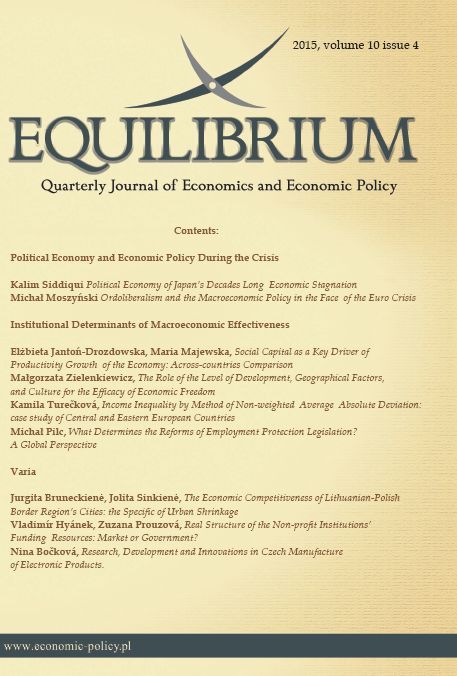Social capital as a key driver of productivity growth of the economy: across-countries comparison
DOI:
https://doi.org/10.12775/EQUIL.2015.035Keywords:
welfare, social capital, knowledge economyAbstract
The aim of this work was to show the possible impact of social capital on productivity of the economy. That impact can be measured by such indicators of productivity of the economy as used in our study: the GDP, the total value added of the economy (TVE), and the GNI per total labour force. Thus, this paper was organized as follows: its first part presents the relationship between the development of social capital and productivity growth of the country in the light of the economic development theory. In this context, it is pointed out that the significance of social capital as a component of the productivity potential of a given country increases when such country moves to the next stages of economic development. Therefore, social capital becomes a very important driver of the upgrading of national incomes in those countries, in which competitive advantages are based primarily on intellectual capital assets. The another part of the paper describes the methodology and the results of a research conducted on a group of 100 countries in the years 2012-2013 with an aim to illustrate the link between social capital and productivity of the economy as a whole referred to, or indicated, in the first part of the study. The results of the research allowed us to formulate a conclusion that without an appropriate ethical behaviour, not only in business, the productivity growth is hampered because it translates into a lower level of trust and unwillingness to cooperate. In other words, as, among others, W. Bartoszewski stressed, "it is worth to be decent".
Downloads
References
Coleman, J. S. (1988). Social Capital in the Creation of Human Capital. American Journal of Sociology, 94. DOI: http://dx.doi.org/10.1086/228943.
Czapiński, J. (2014). Kapitał społeczny. In J. Czapiński, T. Panek (Ed.), Diagnoza społeczna 2013. Warunki i jakość życia Polaków. Warszawa: Drukarnia Braci Grodzickich.
Fukuyama, F. (1997). Zaufanie. Kapitał społeczny a droga do dobrobytu. Warszawa-Wrocław: Wydawnictwo Naukowe PWN.
Gajowiak, M. (2011). Kapitał społeczny a wzrost gospodarczy ? wybrane aspekty. In Z. Tomczonek, J. Prystrom (Ed.), Gospodarka i społeczeństwo wobec wyzwań XXI wieku. Warszawa: Difin.
Gellauff, G. (2003). Social capital: an indispensable asset in the knowledge-based economy. Paper for the workshop Social Capital and Economic Development on the occasion of the 75th anniversary of the University of Tilburg. Retrieved from citeseerx.ist.psu.edu/viewdoc/downloaded/pdf (30.01.2015).
Jantoń-Drozdowska, E., & Majewska, M. (2013). Deepening of Specialization in International Trade as a Determinant of the Country's Economic Development, Transformations in Business & Economics, 12 (2B (29B)).
Josten, S. D. (2013). Middle-class Consensus, Social Capital and the Fundamental Causes of Economic Growth and Development. Journal of Economic Development, 38(1).
Kostro, K. (2005). Kapitał społeczny w teorii ekonomicznej. Gospodarka narodowa, 7-8.
Legatum Institute: http://www. prosperity.com/social.aspx (1.03.2015).
Libertowska, A. (2014). Social Capital in Knowledge Based Economy, Chosen Aspects. Quarterly Journal Oeconomia Copernicana, 5(3).
Łopaciuk-Gonczarek, B. (2012). Mierzenie kapitału społecznego, Gospodarka narodowa, 1-2.
Majewska, M. (2012). Kapitał relacji jako składnik infrastruktury społecznej gospodarki opartej na wiedzy. In Gospodarka elektroniczna. Wyzwania rozwojowe. Tom I. Zeszyty Naukowe Uniwersytetu Szczecińskiego, 702. Ekonomiczne Problemy Usług, 87.
Majewska, M. (2013 b). Ocena zdolności technologicznych kraju. Nierówności społeczne a wzrost gospodarczy, 32.
Majewska. M.. (2013 a). Corruption and Social Capital Development. Zarządzanie Publiczne, 3(23). http://dx.doi.org/10.4467/20843968ZP.13.021.1421.
OECD, (2013). OECD Compendium of Productivity Indicators 2013. OECD Publishing. DOI: http://dx.doi.org/10.1787/pdtvy-2013-en.
Przygodzki, Z. (2004). Znaczenie kapitału społecznego w rozwoju. In A. Jewtuchowicz (Ed.), Wiedza, innowacyjność, przedsiębiorczość a rozwój regionów. Łódź: Wydawnictwo Uniwersytetu Łódzkiego.
Rizwan, A., Muhammad, A. A., Farooq, M. M. (2011). Social Capital Impact On Economic Development (A Theoretical Perspective). International Journal of Business Management & Economic Research, 2(4).
Streeten, P. (2002). Reflections on Social and Antisocial Capital. Journal of Human Development, 3 (1). DOI: http://dx.doi.org/10.1080/14649880105362.
UNCTAD: http://unctadstat.unctad.org/wds/reportFolders/reportFolders.aspx (1.03.2015).
Wildowicz-Gigiel, A. (2008). Rola kapitału społecznego w procesie tworzenia i transferu wiedzy. In K. Piech, S. Pangsy-Kania (Ed.), Innowacyjność w Polsce w ujęciu regionalnym. Nowe teorie, rola funduszy unijnych i klastrów. Warszawa: Instytut Wiedzy i Innowacji.
World Bank: http:web.worldbank.org/topics/socialdevelopment (1.03.2015).
World Bank: http:web.worldbank.org/wbsite/external?topics/exttsocialcapital (1.03.2015).
World Economic Forum, (2013). The Global Competitiveness Report 2013-2014. Geneva.






